Marcia Thornton Jones's Blog, page 83
May 8, 2020
Tiptoeing Out Of My Comfort Zone -- by Jane Kelley

My family left me in the Badlands.
Lee and Sofia were headed out on Notch Trail. According to the guidebook, this path would eventually follow a ledge to a dramatic view. It was "NOT recommended for anyone with a fear of heights."
The words that made my stomach churn made Notch Trail irresistible for Lee and Sofia. I wanted to go with them. But I couldn't. Not after I had cowered in the backseat as our car had zigged and zagged up 12000 feet of the Bear Tooth Highway. Nope. Not going to happen.
Instead, I opted for Door Trail. It was labeled easy and accessible. When the boardwalk ended, however, there would be a way to keep going. Travel at that point would be at my own risk.

I went beyond the easy boardwalk, where there was no trail, all the way to the land's end.
I scaled the sides of steep canyons, outwitted treacherous snakes, got lost in an unforgiving wilderness, and followed astronomical clues to find my way back. Or maybe I just had all those adventures in my mind.
Lee and Sofia said that I could easily have done their hike. It wasn't that frightening.
Maybe I could have. But for me it was better to go at my own pace. In my own way. Thinking that the trail was easy. And then being surprised that I wanted to keep going and going and going.
I often say that, if I'd I known how challenging it is to be a writer, I would never have embarked upon this journey. Luckily I didn't. Sometimes I find the knowledge absolutely terrifyingly paralyzing. I feel overwhelmed by the challenge of having a unique voice, creating likable characters, a strong plot, with something to say to kids I feel further and further from.
But then, somehow, I just start walking along. Bird by bird, and word by word. And before I know it, I've made up a world. Where there was none. A world far from my comfort zone.
Published on May 08, 2020 07:30
May 1, 2020
Smack Dab News
May 5, 2020When I Hit the Roadhits shelvesfor middle grade readers
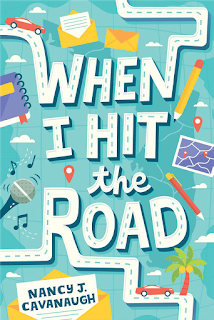
A madcap road trip featuringa karaoke-loving grandmaand a wild summer of memoriesthat will last a lifetime.
"A perfect beach read." Kirkus
"Young readers excitedly anticipating carefree summer fun,or road trips of their own, will enjoyWhen I Hit the Road." Booklist
Your Story Soup ... New Opportunity for Readers!
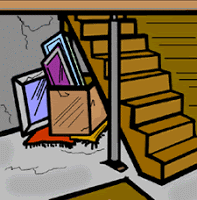
If you're looking for a little distraction for the kiddos -- yours or the ones you teach (or simply know) -- send them to Your Story Soup.
It's sort of like the Stone Soup story...Four authors -- Jody Feldman (from here at Smack Dab), EllenBooraem, Stacy Nyikos, and Barrie Summy -- are providing the pot and stone (story starters); readers bring the ingredients that go into the serialized story. Should be great fun!
The first segment goes up Monday, May 4, but the kiddos (and you) can take a look at the teaser right now.

A madcap road trip featuringa karaoke-loving grandmaand a wild summer of memoriesthat will last a lifetime.
"A perfect beach read." Kirkus
"Young readers excitedly anticipating carefree summer fun,or road trips of their own, will enjoyWhen I Hit the Road." Booklist
Your Story Soup ... New Opportunity for Readers!


If you're looking for a little distraction for the kiddos -- yours or the ones you teach (or simply know) -- send them to Your Story Soup.
It's sort of like the Stone Soup story...Four authors -- Jody Feldman (from here at Smack Dab), EllenBooraem, Stacy Nyikos, and Barrie Summy -- are providing the pot and stone (story starters); readers bring the ingredients that go into the serialized story. Should be great fun!
The first segment goes up Monday, May 4, but the kiddos (and you) can take a look at the teaser right now.
Published on May 01, 2020 05:30
April 29, 2020
Poetry and Pandemic
by Charlotte Bennardo
As our blog indicates, we're supposed to be celebrating National Poetry Month. But... we're all preoccupied with the pandemic of Covid-19. Actually, these two situations pair well:
You could read books of poetry while waiting out the pandemic. It would pass the time and maybe you'll discover new poets whose work you love.
Or, you could write your own poetry, which may help you sort emotions and release some stress.
In my house, we chose to do the later: poetry on our refrigerator. Anyone passing by can mix and match little magnetic words.
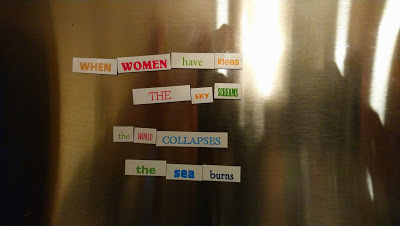
I'm sure reading the above has you thinking, "that sounds kind of insulting..." (It says: When women have ideas the sky screams, the world collapses, the sea burns) Yep. In a house of all males, everything turns into an insult or playful dig. It's the only way my sons will enjoy poetry- by making it a funny insult. I'm good with that, because I can give as good as I get:
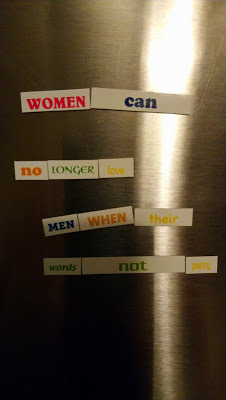
(Women can no longer love men when their words [are] not poetry).
We've been going back and forth, but there are not enough nouns, adjectives, and verbs (and I don't care what ANYONE says, adverbs are necessary). So, after two weeks, the boys lost interest.
But maybe if I made up more words, wrote them on cut up index cards and used double-sided tape or glue to affix them onto those magnets from dentists, lawn care & other companies that are probably sitting in a junk drawer, instead of simple sentences, I might have enough words to do stanzas or even epics in verse. The words simple enough to make, or you can order magnetic poetry tiles and get the family involved. Who doesn't love a good insult? (and it's writing made fun!)
Hoping you all are well and stay well-
Char
As our blog indicates, we're supposed to be celebrating National Poetry Month. But... we're all preoccupied with the pandemic of Covid-19. Actually, these two situations pair well:
You could read books of poetry while waiting out the pandemic. It would pass the time and maybe you'll discover new poets whose work you love.
Or, you could write your own poetry, which may help you sort emotions and release some stress.
In my house, we chose to do the later: poetry on our refrigerator. Anyone passing by can mix and match little magnetic words.

I'm sure reading the above has you thinking, "that sounds kind of insulting..." (It says: When women have ideas the sky screams, the world collapses, the sea burns) Yep. In a house of all males, everything turns into an insult or playful dig. It's the only way my sons will enjoy poetry- by making it a funny insult. I'm good with that, because I can give as good as I get:

(Women can no longer love men when their words [are] not poetry).
We've been going back and forth, but there are not enough nouns, adjectives, and verbs (and I don't care what ANYONE says, adverbs are necessary). So, after two weeks, the boys lost interest.
But maybe if I made up more words, wrote them on cut up index cards and used double-sided tape or glue to affix them onto those magnets from dentists, lawn care & other companies that are probably sitting in a junk drawer, instead of simple sentences, I might have enough words to do stanzas or even epics in verse. The words simple enough to make, or you can order magnetic poetry tiles and get the family involved. Who doesn't love a good insult? (and it's writing made fun!)
Hoping you all are well and stay well-
Char
Published on April 29, 2020 06:00
April 27, 2020
Real, Live Poets
When most middle grade kids think of poets, they picture...
 someone like this. (That's Percy Bysshe Shelley, btw--a pretty cool dude, though he probably doesn't look very exciting to tweens.)
someone like this. (That's Percy Bysshe Shelley, btw--a pretty cool dude, though he probably doesn't look very exciting to tweens.)
That's why, when I was a middle grade teacher, I loved introducing students to the work of living poets. I once had a class read an entire collection by Billy Collins, and guess what? They loved it! They couldn't believe that poetry could be funny and of-the-moment and conversational. Their idea of poetry had always been something to the tune of, "Art thou a flower, o thou flower?" Or assorted other odes to nature. Not knocking a good ode to nature, but other subjects have been covered since the Romantic period.
And wouldn't you know it? Smack Dabber Irene Latham is a real, live poet! And she's amazing! And she does school visits! She once visited my classroom and dazzled the kids. They hung on her every word. If nothing else, I can confidently say that my students are fully aware that poetry is alive and well.
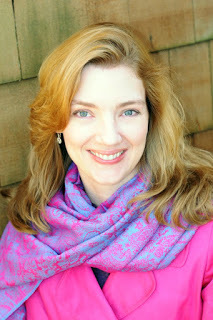 I'd encourage parents and teachers to make plans now to book a real, live poet such as Irene for a school visit next year.
I'd encourage parents and teachers to make plans now to book a real, live poet such as Irene for a school visit next year.
Happy Poetry Month!
Ginger Rue is the author of the Aleca Zamm series from Aladdin and the Tig Ripley series from Sleeping Bear.
 someone like this. (That's Percy Bysshe Shelley, btw--a pretty cool dude, though he probably doesn't look very exciting to tweens.)
someone like this. (That's Percy Bysshe Shelley, btw--a pretty cool dude, though he probably doesn't look very exciting to tweens.)That's why, when I was a middle grade teacher, I loved introducing students to the work of living poets. I once had a class read an entire collection by Billy Collins, and guess what? They loved it! They couldn't believe that poetry could be funny and of-the-moment and conversational. Their idea of poetry had always been something to the tune of, "Art thou a flower, o thou flower?" Or assorted other odes to nature. Not knocking a good ode to nature, but other subjects have been covered since the Romantic period.
And wouldn't you know it? Smack Dabber Irene Latham is a real, live poet! And she's amazing! And she does school visits! She once visited my classroom and dazzled the kids. They hung on her every word. If nothing else, I can confidently say that my students are fully aware that poetry is alive and well.
 I'd encourage parents and teachers to make plans now to book a real, live poet such as Irene for a school visit next year.
I'd encourage parents and teachers to make plans now to book a real, live poet such as Irene for a school visit next year.Happy Poetry Month!
Ginger Rue is the author of the Aleca Zamm series from Aladdin and the Tig Ripley series from Sleeping Bear.
Published on April 27, 2020 22:00
April 26, 2020
Unblocking the (Writer's) Blocks, by Chris Tebbetts
Here’s my tiny contribution to the lapse in creative focus that so many of us seem to be experiencing at this time: a few thoughts on how to creatively unblock when the writing just won’t flow.
- Don't take it too seriously. There's a fine line between "blocked" and "I don't feel like doing this right now." One of the tough things about writing is doing it when you don't feel like doing it. In that way, for me, it's like any other job, and some days I write good stuff, and some days, I write terrible stuff -- but I make a goal of showing up, either way.
- Write a scene you are really clear about in the story -- something with a lot of energy to it. Even if it's a really bad first draft, and even if you end up throwing out that version later, it will help get you started, and into the story.
- Give yourself a certain amount of time—5 minutes, 15 minutes, 30 minutes, whatever—and start writing your story. It doesn't matter how bad it is. Just keep writing until the time is up. Whenever I do this, I ALWAYS come up with at least one little thing that I like and can use.

- Try the above idea when you FIRST wake up, when your mind is clear and you haven't started your day. See what comes out then.
- Do something that is related to your story, but isn't necessarily about drafting the story itself. For example(s):
Make a list of things you know for sure have to happen in your story. Then write as much as you know about each of those items. It can be in a list, or paragraph form. What is the setting? Who is there? What happens in that moment/scene? What has changed by the end of that moment/scene? (I find things like making lists, and brainstorming, can be a great way to stay productive, especially when coherent prose seems to be out of my reach at the moment.)
Write a journal entry as one of your characters--something you just make up as you go along, without any need for it to be good or bad.
Write a dialogue between two or more characters -- just the spoken words, like a script. Put them in a setting and/or a situation, and just start writing. Again, it doesn't have to be something that winds up in your finished story, but it can help you explore and figure out their relationship, the way they relate to each other, etc.
Do some research. Make it easy, but productive -- like googling for news stories that might relate to your story’s subject; or looking for images to illustrate your ideas in progress; or reading up on some part of the story that fascinates you (or conversely, some aspect of the story you know the least about). For me, casual research like this almost always sparks some new story idea.
- Lastly, as a bit of a tangent, here’s a link to the webinar I recently offered through the Highlights Foundation on the subject of Visual Outlining. That’s something I’ve blogged about on this site before, but this video is a kind of hands-on re-visitation of that topic, and also, for me, includes several techniques that I find useful when drafting that manuscript, or moving that story a bit further along feels out of reach.
Check out my webinar here: https://www.highlightsfoundation.org/16257/visual-outlining-webinar-with-chris-tebbetts/?fbclid=IwAR0hKI0mPzlc3wO2ZPhhhRfH9GdXEjeABTsRox9gkDne4SxVI5oK7aVuDKU
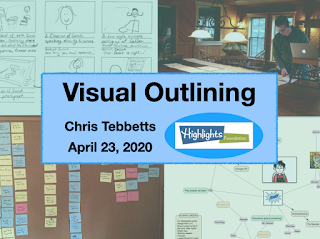
And here’s to a productive Spring-into-Summer, wherever you may find yourself hunkered down!
- Don't take it too seriously. There's a fine line between "blocked" and "I don't feel like doing this right now." One of the tough things about writing is doing it when you don't feel like doing it. In that way, for me, it's like any other job, and some days I write good stuff, and some days, I write terrible stuff -- but I make a goal of showing up, either way.
- Write a scene you are really clear about in the story -- something with a lot of energy to it. Even if it's a really bad first draft, and even if you end up throwing out that version later, it will help get you started, and into the story.
- Give yourself a certain amount of time—5 minutes, 15 minutes, 30 minutes, whatever—and start writing your story. It doesn't matter how bad it is. Just keep writing until the time is up. Whenever I do this, I ALWAYS come up with at least one little thing that I like and can use.

- Try the above idea when you FIRST wake up, when your mind is clear and you haven't started your day. See what comes out then.
- Do something that is related to your story, but isn't necessarily about drafting the story itself. For example(s):
Make a list of things you know for sure have to happen in your story. Then write as much as you know about each of those items. It can be in a list, or paragraph form. What is the setting? Who is there? What happens in that moment/scene? What has changed by the end of that moment/scene? (I find things like making lists, and brainstorming, can be a great way to stay productive, especially when coherent prose seems to be out of my reach at the moment.)
Write a journal entry as one of your characters--something you just make up as you go along, without any need for it to be good or bad.
Write a dialogue between two or more characters -- just the spoken words, like a script. Put them in a setting and/or a situation, and just start writing. Again, it doesn't have to be something that winds up in your finished story, but it can help you explore and figure out their relationship, the way they relate to each other, etc.
Do some research. Make it easy, but productive -- like googling for news stories that might relate to your story’s subject; or looking for images to illustrate your ideas in progress; or reading up on some part of the story that fascinates you (or conversely, some aspect of the story you know the least about). For me, casual research like this almost always sparks some new story idea.
- Lastly, as a bit of a tangent, here’s a link to the webinar I recently offered through the Highlights Foundation on the subject of Visual Outlining. That’s something I’ve blogged about on this site before, but this video is a kind of hands-on re-visitation of that topic, and also, for me, includes several techniques that I find useful when drafting that manuscript, or moving that story a bit further along feels out of reach.
Check out my webinar here: https://www.highlightsfoundation.org/16257/visual-outlining-webinar-with-chris-tebbetts/?fbclid=IwAR0hKI0mPzlc3wO2ZPhhhRfH9GdXEjeABTsRox9gkDne4SxVI5oK7aVuDKU

And here’s to a productive Spring-into-Summer, wherever you may find yourself hunkered down!
Published on April 26, 2020 08:40
April 25, 2020
Secret Poetry Writing (Holly Schindler)
When I was in high school, I kept a journal. It was the only successful journal I ever managed. Usually, I get a few entries in, and completely lose interest. But this journal, I wrote in nearly every single day.
And every entry was a poem.
I think that journal was so good for me, in so many ways. In the first place, it kept me writing even when I didn't have a bigger project going on. It made me reach for metaphorical ways to describe what had happened to me that day. And because it was a journal, it was never meant to be seen by anyone. Which meant that I felt free to play and experiment.
And, as we all know, play is instrumental to good writing.
If you're looking for a way to stretch your creative muscles and document this strange time in history--and our lives!--I highly recommend trying a poetry journal.
Things to remember:
*Poetry is powerful largely because an emotion (rather than a character) is the star.
*Poetry can strive to turn the mundane into something unique.
*Poetry is short and punchy--two lines? No problem.
*Poetic forms are easily found online. Experiment! Free verse is cool, but why not a villanelle or cinquain?
*Poetry relies on the experimental. Be gutsy!
*Poetry is what you make of it.
Innovate. Document. Create.
And every entry was a poem.
I think that journal was so good for me, in so many ways. In the first place, it kept me writing even when I didn't have a bigger project going on. It made me reach for metaphorical ways to describe what had happened to me that day. And because it was a journal, it was never meant to be seen by anyone. Which meant that I felt free to play and experiment.
And, as we all know, play is instrumental to good writing.
If you're looking for a way to stretch your creative muscles and document this strange time in history--and our lives!--I highly recommend trying a poetry journal.
Things to remember:
*Poetry is powerful largely because an emotion (rather than a character) is the star.
*Poetry can strive to turn the mundane into something unique.
*Poetry is short and punchy--two lines? No problem.
*Poetic forms are easily found online. Experiment! Free verse is cool, but why not a villanelle or cinquain?
*Poetry relies on the experimental. Be gutsy!
*Poetry is what you make of it.
Innovate. Document. Create.
Published on April 25, 2020 05:30
April 22, 2020
Imagination in the Time of Coronavirus: Smack Dab in the Imagination by Dia Calhoun
Separated from your usual activities--school, work, social life--now is the time to get close to your imagination. Imagination loves introversion, rambling, reflection, and quiet. In our busy lives, we usually keep imagination much farther than six feet away. But now you can hold your imagination in your arms. You can run with it, hand in hand. Have have lunch with it. You can see where it leads you now that you have time to spend with it. No social distancing needed!
Gabriel Garcia Marquez wrote the famous novel Love in the Time of Cholera. Maybe someone will write Imagination in the Time of Novel Coronavirus. For that matter--write a coronavirus novel.
Ask what your imagination been telling you all these years. Now you have time to listen.
Gabriel Garcia Marquez wrote the famous novel Love in the Time of Cholera. Maybe someone will write Imagination in the Time of Novel Coronavirus. For that matter--write a coronavirus novel.
Ask what your imagination been telling you all these years. Now you have time to listen.
Published on April 22, 2020 22:00
April 21, 2020
NEW MG: Wishes, Dares, and How to Stand Up to a Bully
Today, Smack Dab bloggers Holly Schindler and Darlene Beck Jacobson discuss Darlene's latest release, Wishes, Dares, and How to Stand Up to a Bully -
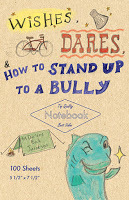
HS: Give us the elevator pitch.
DBJ: This novel in verse crystallizes a boy's worries about his father, who is MIA in Vietnam, and how his family, new best-friend, and a bully unexpectedly help him find the courage to do the right thing, not just the easy thing.
HS: Why the novel in verse? Did you know from the get-go you’d do a novel-in-verse? Or as you wrote, did it become apparent it needed to be?
DBJ: The main character – JACK – spoke to me in a stream-of-consciousness style, no frills just raw and bare emotions and thoughts spilled onto the page as he told me his story. Free verse seemed the perfect format for that.
HS: You’ve written historical fiction before. This time, though, the “historical” is a lot closer to all of us adult writers! How did the drafting of two books compare, in terms of making a bygone time feel real to young readers?
DBJ: The first book – WHEELS OF CHANGE – involved a lot of research online and to historical sites to get the feel of the 1908 Washington, DC setting. WISHES is set in 1964, which required me to channel my own childhood. Recalling the era I grew up in came easy. I think that’s why the writing and revision was easier as well. Many of the things I enjoyed as an eleven year old are in the story.
HS: Poetry seems so intimidating to so many adults! Do you think the same is true of younger kids? Or do you feel that they connect easier to poetry? How so?
DBJ: I think people might be intimidated about some of the “rules” of poetic forms. The free verse format is looser and allows for a freer structure and arrangement of words and phrases on the page. Once you accept that poetry and verse doesn’t have to rhyme, but needs rhythm, it’s fun to try. The various forms of figurative language help provide that rhythm. I think kids are open to that.
HS: Full disclosure: you and I bounced some ideas back and forth a bit as you were in the revision mode. I actually love the revision process, but some writers prefer the first draft. How about you? What’s your favorite part?
DBJ: I love when the idea springs fresh from the imagination and there’s a strong voice to propel it forward. A voice like Jacks, which never wavered or quieted, until I got the story right. That was a first for me. Usually I have an idea, concept, basic storyline, that I fill in with characters and details. For me, that is a much harder format to sustain through a first draft. Give me a character with a strong and determined voice and I’ll run with it. It makes everything from first draft to revisions so much easier.
HS: What does poetry allow you to do that prose can’t—and vice versa? What did you find liberating about a novel-in-verse? What did you find confining?
DBJ: The novel-in-verse format really gets to the heart of the matter. It allows the characters to bring conflict/worries/problems out into the open without a lot of scene setting and back story. Dialogue doesn’t have to be in quotes, and words are laid out in unusual ways on the page. For me that was liberating, rather than confining.
HS: What’s next?
SBJ: I am in the early stages of a middle grade contemporary novel in verse.
HS: Favorite passage / poem from WISHES?
DBJ: There were a few, but this one really resonated with me, and I think it would with kids as well:
DARKWhen I was Katy’s age, I used to beafraid of the dark.Shadows on the wall from cars passing by,flashing headlightssounds of the nightmade me bury my face under the covers.
I imagined all the scary things I couldn’t see,hidinglurkingwaiting to get meif I wasn’t watchful. One night,I woke up crying after a nightmare,screaming for the monsters to go away.
Mom and Dad rushed into the room. Dad pulledme onto his lap, rocking meuntil I stopped crying.He asked me wherethe scary places were. As I pointed out each one,he pointed a flashlight beam on it.This is what it looks likein the light, he said. No matter how many timeswe turn off the light, it doesn’t change. Hehanded the light to me andtold me to shine it wherever I thoughtthe scary things were. I moved the beam in allthe cornersunder the bedinside the closetbehind the doorflicking it on and off until I was satisfied.
Then Dad said,remember in the dark what you learn in the light.
The dark doesn’t scare me anymore,but sometimes,times like this,it makes me sad.
Thanks for having me on the blog Holly. I really enjoyed talking about WISHES, DARES AND HOW TO STAND UP TO A BULLY and hope readers did as well.
BIO:
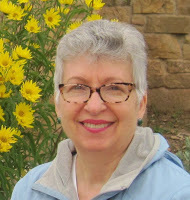 Darlene Beck Jacobson is a former teacher and speech therapist who has loved writing since she was a girl. She is also a lover of history and can often be found mining dusty closets and drawers in search of skeletons from her past. She enjoys adding these bits of her ancestry to stories such as her award-winning middle grade historical novel WHEELS OF CHANGE (Creston 2014) and WISHES, DARES, AND HOW TO STAND UP TO A BULLY (Creston 2020). Darlene lives and writes her stories in New Jersey with her family and a house full of dust bunnies. She’s caught many fish, but has never asked one to grant her a wish. She’s a firm believer in wishes coming true, so she tries to be careful what she wishes for. Her blog features recipes, activities, crafts, articles on nature, book reviews, and interviews with children’s book authors and illustrators.
Darlene Beck Jacobson is a former teacher and speech therapist who has loved writing since she was a girl. She is also a lover of history and can often be found mining dusty closets and drawers in search of skeletons from her past. She enjoys adding these bits of her ancestry to stories such as her award-winning middle grade historical novel WHEELS OF CHANGE (Creston 2014) and WISHES, DARES, AND HOW TO STAND UP TO A BULLY (Creston 2020). Darlene lives and writes her stories in New Jersey with her family and a house full of dust bunnies. She’s caught many fish, but has never asked one to grant her a wish. She’s a firm believer in wishes coming true, so she tries to be careful what she wishes for. Her blog features recipes, activities, crafts, articles on nature, book reviews, and interviews with children’s book authors and illustrators.www.darlenebeckjacobson.comTwitter: @DBeckJacobsondarlenejacobson13@gmail.com
ISBN: 978-1-939547-62-0
Some reviews:“Uniquely original and with an important underlying social message for children ages 8-12, "Wishes, Dares, and How to Stand Up to a Bully" is especially and unreservedly recommended for elementary school, middle school, and community library General Fiction collections. http://www.midwestbookreview.com/cbw/dec_19.htm
To see previous post in tour: APRIL 7 (BOOK BIRTHDAY) https://viviankirkfield.com/
Win a copy of the book: http://www.kathytemean.wordpress.com
TO ORDER:
Amazon
B&N
Published on April 21, 2020 00:00
April 20, 2020
What I Believe by Norma Fox Mazer
For poetry month, I thought I'd highlight one of my all-time favorite books - What I Believe by Norma Fox Mazer.
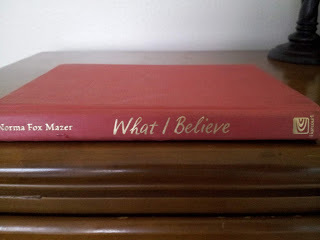 What I Believe is the story of a girl named Vicki whose father loses his job. As a result, her family's life changes dramatically, and she finds herself having to handle a whole new set of circumstances. But when her jobless dad ends up finally walking out on the family, Vicki's situation takes an even more dramatic turn, and she is faced with a dilemma in which making the right choice seems nearly impossible.
What I Believe is the story of a girl named Vicki whose father loses his job. As a result, her family's life changes dramatically, and she finds herself having to handle a whole new set of circumstances. But when her jobless dad ends up finally walking out on the family, Vicki's situation takes an even more dramatic turn, and she is faced with a dilemma in which making the right choice seems nearly impossible.
I love this book because the voice of each character is so authentic, and the story itself holds conflict and tension that is, on the surface, very simple; and yet, on an emotional level, deeply layered and heartfelt.
The reason I'm highlighting What I Believe this month in my post is because the entire story is told through poetry. Mazer's use of this device to tell this story is absolutely amazing! With very few words, arranged in such a creative way, she cuts to the heart of Vicki's story, and readers are treated to a front row seat. In one word, it's remarkable. In my opinion, the book is a perfect example of the power of poetry.
Happy April!
Happy Poetry Month!
Happy Reading & Writing!
Nancy J. Cavanaugh
www.NancyJCavanaugh.com
 What I Believe is the story of a girl named Vicki whose father loses his job. As a result, her family's life changes dramatically, and she finds herself having to handle a whole new set of circumstances. But when her jobless dad ends up finally walking out on the family, Vicki's situation takes an even more dramatic turn, and she is faced with a dilemma in which making the right choice seems nearly impossible.
What I Believe is the story of a girl named Vicki whose father loses his job. As a result, her family's life changes dramatically, and she finds herself having to handle a whole new set of circumstances. But when her jobless dad ends up finally walking out on the family, Vicki's situation takes an even more dramatic turn, and she is faced with a dilemma in which making the right choice seems nearly impossible.I love this book because the voice of each character is so authentic, and the story itself holds conflict and tension that is, on the surface, very simple; and yet, on an emotional level, deeply layered and heartfelt.
The reason I'm highlighting What I Believe this month in my post is because the entire story is told through poetry. Mazer's use of this device to tell this story is absolutely amazing! With very few words, arranged in such a creative way, she cuts to the heart of Vicki's story, and readers are treated to a front row seat. In one word, it's remarkable. In my opinion, the book is a perfect example of the power of poetry.
Happy April!
Happy Poetry Month!
Happy Reading & Writing!
Nancy J. Cavanaugh
www.NancyJCavanaugh.com
Published on April 20, 2020 04:30
April 19, 2020
The Perks of Isolation
Isolation has always fascinated me in both books and films. What happens when people are taken from their normal or typical routine and forced to face the limits of being alone?
The Shining. The Haunting of Hill House. Hatchet. The Island of the Blue Dolphins. My Side of the Mountain. Whisper of Death.
These were all some of my favorite books and stories growing up, and even now. The fright and panic is real - but the character that tends to pull through in so many, to not only persevere but to actually thrive - is what is remarkable and keeps me turning the pages.
We have become versions of some of these characters in this strange new world. Writers perhaps, better than most, know what it’s like to have a day-to-day life working in the in-home office. The kids in the background, the dog scratching at the door or a cat across the keyboard, the phone ringing or TV too loud. We have to work around it without going bananas.
This time it’s different, though. It’s scary. There’s a ravaging illness that is threatening us and those we love. It is harder. It is difficult to focus and some days, to find the light.
Still, I believe we will all find that light. By taking are of ourselves, and each other. By not pushing too hard and letting ourselves reflect and read and check in and rest. I deeply hope for the best in that we all find our true, shining character and pull through for ourselves and for each other, even those we have never met or will meet. If we can see in literature how a flawed person takes themselves through isolation, perhaps we, too, can see ourselves doing it, too.
I think its especially important for young readers, who have yet to experience an event of this magnitude, even in a safe or shorter environment.
While not middle grade, my first young adult novel, Break the Spell, focused on isolation. I wanted to see what would happen when two troubled teenagers were finally left with nothing but to face the adversities they’d been avoiding for so, so long when they become locked up in the old high school over a long holiday weekend. There are points it brings out their worst, and times it brings out their best. There are times they make cookies or roller-skate down a hallway or simply read and talk.
I hope, like, at the end of Break the Spell, we all emerge together into the light, ready for a new world. Maybe even a new us.
Happy Reading!
A.M. Bostwick
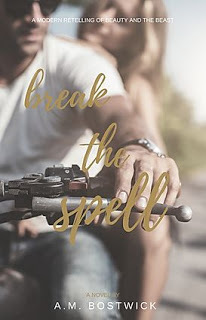
The Shining. The Haunting of Hill House. Hatchet. The Island of the Blue Dolphins. My Side of the Mountain. Whisper of Death.
These were all some of my favorite books and stories growing up, and even now. The fright and panic is real - but the character that tends to pull through in so many, to not only persevere but to actually thrive - is what is remarkable and keeps me turning the pages.
We have become versions of some of these characters in this strange new world. Writers perhaps, better than most, know what it’s like to have a day-to-day life working in the in-home office. The kids in the background, the dog scratching at the door or a cat across the keyboard, the phone ringing or TV too loud. We have to work around it without going bananas.
This time it’s different, though. It’s scary. There’s a ravaging illness that is threatening us and those we love. It is harder. It is difficult to focus and some days, to find the light.
Still, I believe we will all find that light. By taking are of ourselves, and each other. By not pushing too hard and letting ourselves reflect and read and check in and rest. I deeply hope for the best in that we all find our true, shining character and pull through for ourselves and for each other, even those we have never met or will meet. If we can see in literature how a flawed person takes themselves through isolation, perhaps we, too, can see ourselves doing it, too.
I think its especially important for young readers, who have yet to experience an event of this magnitude, even in a safe or shorter environment.
While not middle grade, my first young adult novel, Break the Spell, focused on isolation. I wanted to see what would happen when two troubled teenagers were finally left with nothing but to face the adversities they’d been avoiding for so, so long when they become locked up in the old high school over a long holiday weekend. There are points it brings out their worst, and times it brings out their best. There are times they make cookies or roller-skate down a hallway or simply read and talk.
I hope, like, at the end of Break the Spell, we all emerge together into the light, ready for a new world. Maybe even a new us.
Happy Reading!
A.M. Bostwick

Published on April 19, 2020 01:00



